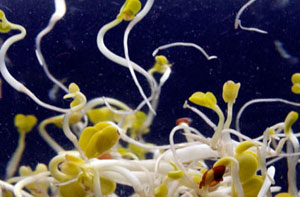New E.coli bacteria: Faster, more toxic reproduction
Scientists are digging up the gene sequence of the new E.coli strain to find ways to treat patients as well as prevent similar pandemics in the future.
 Bean sprouts on a farm in northern Germany are the source of the new strain of E. coli bacteria.
Bean sprouts on a farm in northern Germany are the source of the new strain of E. coli bacteria. (Source: Guardian )
Although the new gene sequence of the new strain of E. coli has been sequenced, scientists still do not understand where this bacterium is circulating in Europe and why it is so virulent. According to epidemiologists, the new E.coli strain may be a variant of a strain discovered a decade ago in Germany.
German investigators said that the source of the disease is the bean sprouts grown on a clean vegetable farm in the north of the country. So far, the bacterium has killed at least 35 people and caused 3,100 people to become ill, many of whom have severe kidney failure. Most patients in Germany, the rest came from 13 European and American countries, most of them went to Germany.
Flemming Scheutz, director of the laboratory of the Coordination Center of the World Health Organization (WHO) in Denmark, said that the new strain is very easy to receive new genes. E. coli continuously evolves and exchanges genes with other strains in humans and animals, so there are many opportunities for increased virulence.
Some E.coli strains were also highly virulent, but scientists needed some more samples to understand the new strain. According to Stephen Smith, a microbiologist at Trinity University, Ireland, the new strain of E. coli seems to cling to the human gut in a different way, and reproduce faster than other strains. This is why this strain is deadly.
The researchers also discovered the new strain of E. coli with at least 8 resistance genes for many antibiotics.
- Take a picture of the drug-resistant Ecoli virus
- Close up of beautiful deadly bacteria surprised
- The most toxic and strange forms of bacteria on the planet
- Bacteria eat toxic metals and emit gold
- Find out the bacteria that causes death in humans
- Tiny gas sensors are effective in detecting toxic substances
- More dirty items ... toilet
- Dead outbreak of people hiding in women's handbags
- Check out the types of polar bacteria that are beneficial to humans
- Computer made from bacteria
- Bacteria decipher mysterious human body
- Artificial sweeteners are toxic to gastrointestinal bacteria
 Green tea cleans teeth better than mouthwash?
Green tea cleans teeth better than mouthwash? Death kiss: This is why you should not let anyone kiss your baby's lips
Death kiss: This is why you should not let anyone kiss your baby's lips What is salmonellosis?
What is salmonellosis? Caution should be exercised when using aloe vera through eating and drinking
Caution should be exercised when using aloe vera through eating and drinking